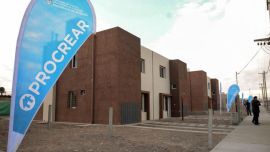Gabriel Boric was inaugurated as Chile’s new president yesterday as a symbol of transformation within a macrocosm of global upheaval – an event which might warrant some attention on the other side of the Andes amid the war in Ukraine and the birth pangs of the agreement with the International Monetary Fund (IMF), given how events in Chile have often heralded trends in Argentina (such as the 1973 coup there predating the 1976 coup here). Could Chile’s elections last spring be the shape of things to come in next year’s voting here – will the fallout from the global crisis and a divisive IMF agreement shatter the two main coalitions, leading to a run-off between two extremist options like the leftist Boric and his rightist rival José Antonio Kast? Or will the uncanny knack of the Alberto Fernández Presidency to turn its unending misfortunes (with the coronavirus pandemic being so rapidly followed by the disruptive and destructive consequences of his erstwhile chum Vladimir Putin) into good luck by finding somebody or something else to blame continue?
In recent decades the two sides of the Andes have also been divided by contrasting international images with Chile portrayed as the poster boy of Latin American development almost on a par with the Asian tigers on the other side of the Pacific while an inflationary Argentina was viewed as an example of what not to do. Yet in recent years Chile itself seems to have seen things increasingly less that way. From this side of the Andes the loss of faith in a model which has quintupled per capita incomes since 1980 while reducing poverty from half the population to just over 10 percent might seem puzzling – frustration with stark inequality and the rigid social immobility accompanying economic stability (a volatile Argentina being free from both) could be a key. Perhaps the drift away from this model already started in the second Michelle Bachelet presidency (2014-2018) while the pension funds bolstering the capital markets which Argentina almost totally lacks began to be dismantled during the coronavirus pandemic. Now the disruptions stemming from Putin’s invasion of Ukraine are placing Chile’s talent for global integration in a new light – few presidents-elect can have seen the world change more in just a dozen weeks between electoral victory and inauguration than Boric but perhaps we have not seen anything yet.
On the other side of the Andes Argentina may not have any model to lose (successful or unsuccessful) given the presidential aversion to plans but Putin’s invasion of Ukraine – starting as atavistic nostalgia but potentially raising the terrifying prospect of nuclear war – is just as hard-hitting here if not more so. World gas prices soaring as much as sevenfold from last year have turned the government’s problems with public service billing into a nightmare – the proposals to freeze or even trim subsidy levels as advanced in the negotiations with the IMF have become a dead letter, given future fuel import prices. And these imports will be inevitable precisely as a result of decades of frozen utility pricing coming home to roost – without that disincentive the vast shale reserves of Vaca Muerta would be fully on stream with the scarcity value to give Argentina a new cash cow in a revived commodity boom. Meanwhile global inflation, already on the rise with the glut of money-printing to counter the pandemic, will oblige the United States to up its interest rates, thus triggering a new round of that capital flight so deplored by the Frente de Todos administration.
Yesterday’s inauguration of Boric, breaking with three decades of alternating mainstream coalitions, takes Chile into uncharted territory but the world as a whole may well be taking an even greater leap into the dark – including Argentina, notwithstanding approval of the IMF agreement (with Peronism typically being simultaneously government and opposition) in the small hours of yesterday.




















Comments